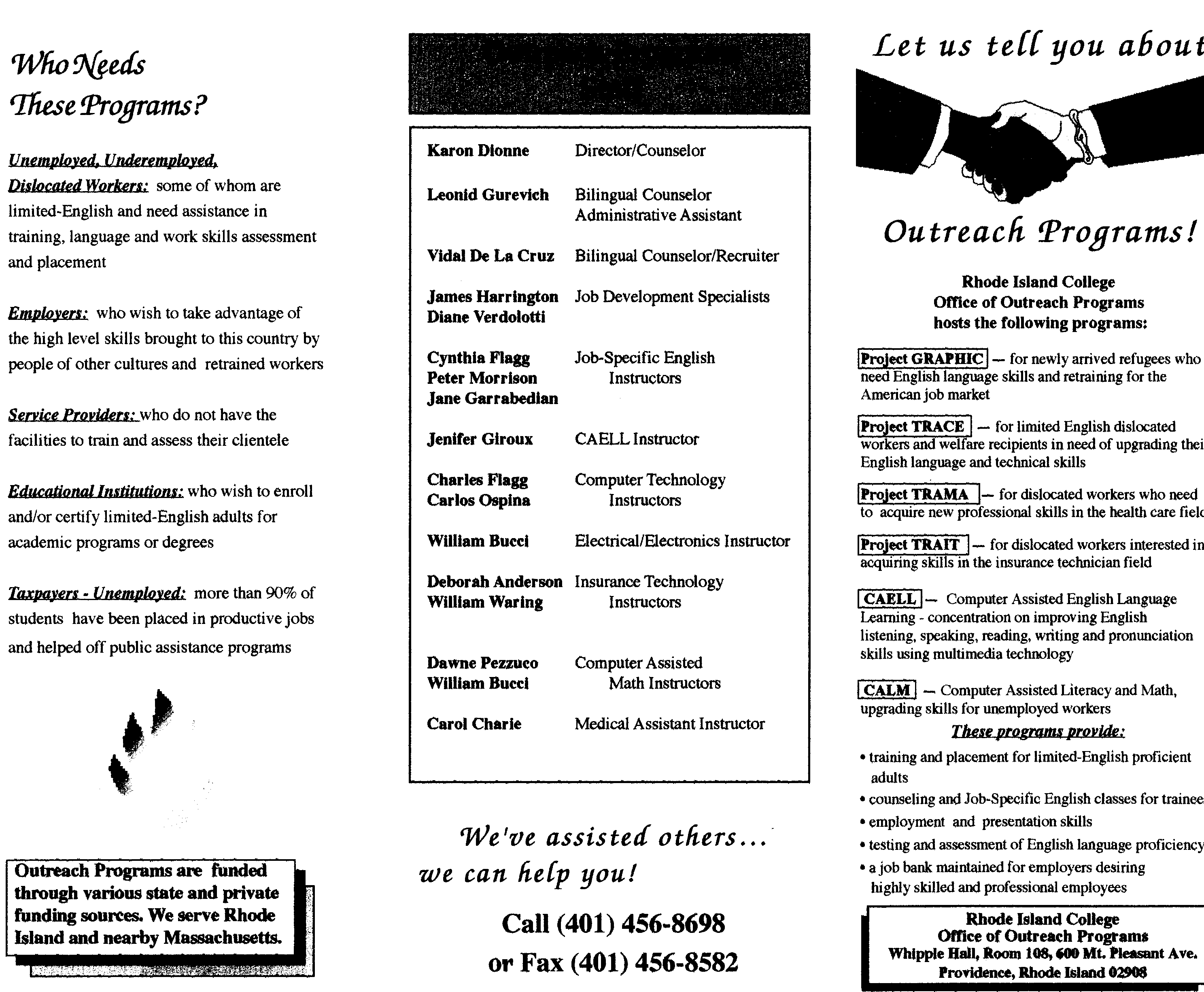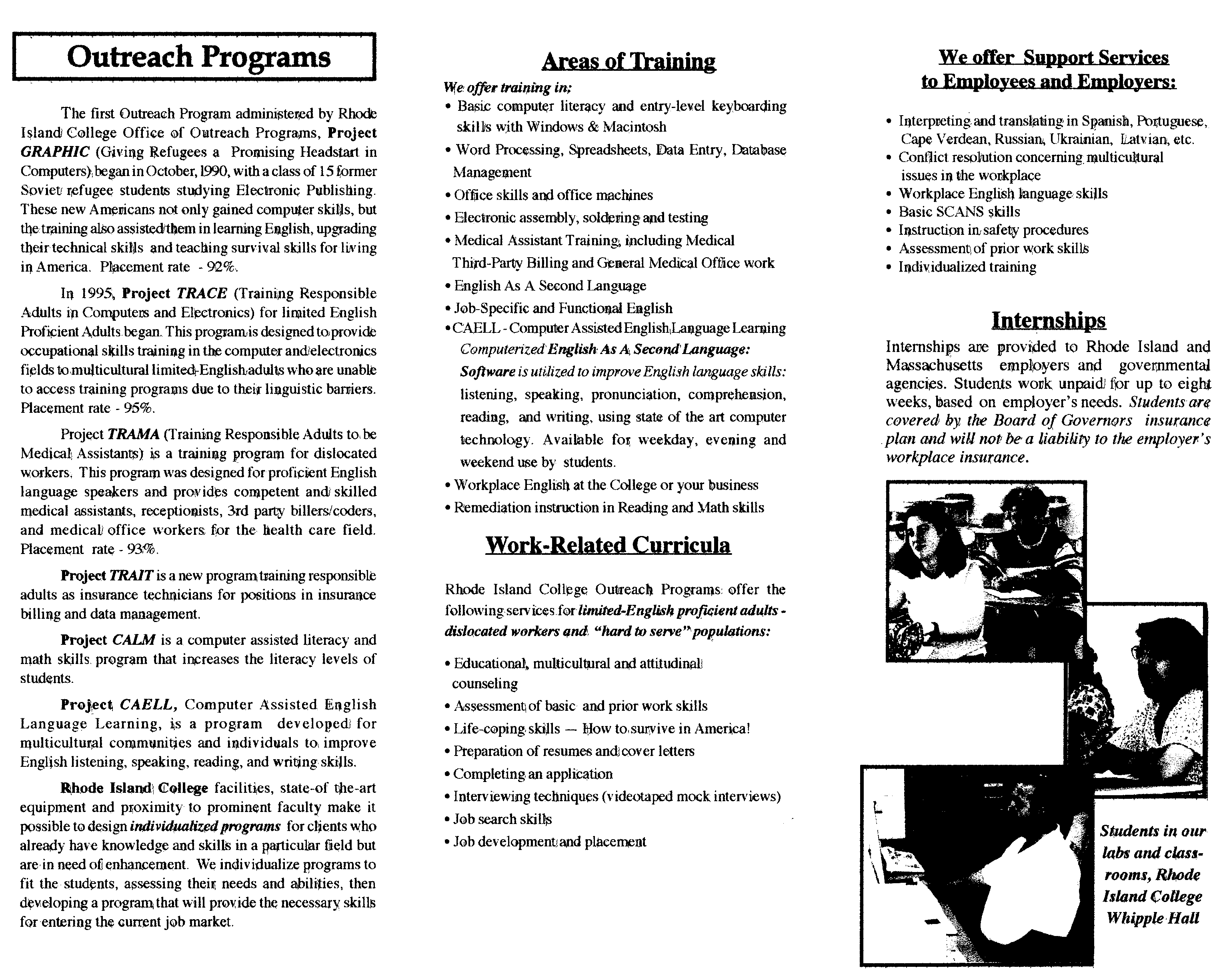Inquiry Project Proposal
Dawne Pezzuco, RI College Outreach Programs
Background:
Rhode Island College Outreach Programs is funded entirely through public and private resources. Our responsibility is to train or retrain the unemployed, underemployed and dislocated workers as well as limited English students and refugees who need to find employment in the American job market. Our students are multicultural, speak Spanish, Portuguese, Creole, Russian and various other languages. Students often begin in our Computer Assisted English Language Learning program and move into our training programs when their English language skills fit the criteria of the course chosen.
There are 5 components to our programs: English as a Second Language, math for everyday living, employment skills, counseling and computer literacy. Keyboarding and office skills as well as literacy training with a concentration on the SCANS skills is also incorporated into our training programs. The specific training areas are Office Skills, Electronic Assembly, Soldering and Testing, Medical Assistant, and Insurance Technician. Students are also counseled and placed in jobs according to the specific area of training they have completed. It is our responsibility to provide training, assist the student in finding employment and follow-up to insure the student stays hired. Attached, please find a brochure explaining the Outreach training programs available.
Math for Everyday Living using assistive computer technology, internet search engines, and various website development fit nicely into the curriculum for mainly women on public assistance, factory workers who had little chance to advance their education or scans skills, and unemployed people who were in need of training in order to find a good job that would afford them a better lifestyle. The topics the students requested were functional everyday living skills that they needed desperately, but had not the time nor incentive to pursue outside a structured environment. It was amazing how well they responded to designing their dream house and how thoroughly enthusiastic they became when they learned that the processes they used were just basic geometry, area, length and width, square feet and area of circles for alcoves.
Their self confidence increased as their ability to navigate search engines and websites developed. They became extremely proficient in using calculators and knowing the instructor encouraged them to use calculators was welcomed wholeheartedly by them.


Students learn though lecture, individual and group instruction, class participation and use of technological resources such as computers, calculators, smart boards and the internet. I have attempted to research the results of my teaching by incorporating and applying technology that applies to everyday life situations.
The main topics of interest chosen by the students were:
Each topic builds on the next as the students reviewed and refreshed the skills they learned in their childhood. They reviewed their skills’ needs remembering real life situations which helped them to make more sense of why they needed to learn or hone their skills in these areas. Many adult students have also explained to me how this class has made it easier for them to help their children with their homework. The children also find it easier when parents explain a problem in an everyday life situation.
I have stated my question for this inquiry in the next paragraph and will try to support my question with the research I have done over the past 9 months.
Question: Can we motivate adult students to learn and refine their mathematics skills through group studies and participation, by using technological resources and an everyday living type of strategy and approach to teaching?
I have been researching the above questions for 9 months and have made many interesting discoveries. It is amazing how many things you notice when you actually pay attention to detail. My students’ level of participation and interest has easily doubled. The attendance rate is about 80% as opposed to 50 or 60% when we first began the project two years ago. This is fantastic especially with our adult learners who have endless personal problems and dilemmas. The students enjoy attending my classes. Instead of feeling like it is a requirement they need to fulfill; they actually enjoy it and look forward to coming to class.
For the first 6 months, I kept a weekly journal of the students’ attitudes, participation levels and progress. Most of them completed their weekly homework as well as sent me emails with questions periodically. I definitely have certain students within the class who participated and wanted to learn more than others. There is not much I can do about helping those adult learners who do not want to help themselves. I have explained to these learners that the students I recommend for internships or employment will be the ones that put the effort into the program. I based my curriculum on the realities that life situations bring and by incorporating the students’ perspectives on their needs in relation to obtaining a good job and the math skills necessary to achieving their goal.
The first class I gave a pre-test to see what educational levels I was dealing with. Next we discussed a series of topics which the students were interested in. I found this worked well as the students knew upfront what they would be learning and actually decided on the subjects themselves. Some of these topics which they found to be of interest were: buying food and shopping for clothes, buying and maintaining a vehicle or home, budgets, banking and investing and preparing for careers. These seemed to be the similar topics stated above which I decided would be of interest to the class also.
The computer has been a great learning tool for the students. The students are eager to improve their computer and internet skills. They are expected to search and find helpful tips on the topic of the week. All students receive copies of the articles researched. The students keep an organized portfolio containing all their work from week to week. They have informed me that they will keep the portfolio handy even after the class has ended to help them with upcoming problems and concerns they may have on a daily basis.
I have set up a math group in my email. I send the students assignments and answer questions on a continuous basis. This keeps the students on their toes and also gives them things to search for when they are using computers in their free time during the week. Students will email me questions, concerns, assignments and attendance problems regularly.
Exams are given periodically, and the students who attend class consistently, do well. I have regular group discussions with the class about the topic of the week and how it affects their daily life. This sometimes gets more involved and time-consuming than I like, but I feel it is an important part of building confidence and understanding the individual needs of the students.
I have completed two different classes during my evaluation period and have seen similar results for each. I evaluated the students and their portfolios as a whole and individually after the completion of the final exam. I feel this benefited myself as well as the students. I believe, if I am successful in motivating my students and understanding their math skills’ needs then I am better prepared to teach them accordingly. The students also felt that I cared more since I was willing to listen to them. Both students and myself feel that communication is a key factor when it comes to productive learning.
I have acquired valuable information over the last nine months and am quite enthusiastic about using this knowledge to enhance my curriculum. I will continue to keep a journal and evaluate students in the future for my own personal use. I know that my curriculum will improve with each new group of students, and it is quite possible that, I may be able to get participation to 100% or at least close to that by allowing students to discuss their math needs and have input into their curriculum.
In conclusion, these are the questions that have arisen during my research. I feel that these questions may lead me into research for inquiry in the future.
How much does an adult learner need to know?
This question can be researched thoroughly over a long period of time. However, my answer to this question is that it depends on how much they are willing to learn and what areas have some type of connection with them at this point in their lives. The hardest part of the instruction is to bring a class together to learn as a whole even though they are at different age, education, cultural and social levels in their lives. This also leads to my next question.
Better ways to teach a large variety of student levels in one adult class? (For example: limited English students, high school graduates, refugees, immigrants, dislocated workers in a multicultural and multilingual environment)
I found through my research that pairing students together works well for these types of widespread classes. The problem is that my “good” students have informed me that they feel that even though they are staying ahead on their own, when they help other students, they are forgetting their instruction and falling behind. I am also working on communication with them since I feel they do not explain to me what areas they need help in until after the class. They do not want to feel inferior in the classroom by asking what may appear to be a foolish question. Unfortunately, this is a never- ending battle which we will work on, since we will always have different levels in the adult classroom and need to adjust accordingly for each class.
How to decrease the amount of preparation work by the instructor when dealing with everyday life situations which change on a daily basis?
One answer to this question is to have the students participate and research more. They can do this by researching the topic of the day themselves and report back their findings to the class as well as forward their discoveries to classmates and me via e-mail. I begin each class with a lecture, and then we go to the computers and find the search engine that best fits our topic, and begin our research on the internet. Sometimes, I reverse the process by directing the students to use the computers during the first half of the class, and thoroughly research the topic before the lecture begins. This way we can study and learn from each other in a group.I found inquiry to be a very exciting and interesting process of researching. I have developed better methods and teaching techniques, and I have increased my own technological knowledge. I have statistical data that supplies me with answers on how I can better motivate my students to enjoy math. By incorporating the use of technology described herein, I feel proud that many students now enjoy using a calculator, searching the internet, and finding themselves capable of solving the math problems of daily living. and research process and am happy I could be part of this program. Both student and teacher benefited from this learning experience, and for me it is only the beginning of additional inquiries that may arise for me.
Educational Criteria:
AGS: American Guidance Service, Inc.Coming Together: Integrating Math and Language
Julie Rumi IwamotoEducational Internet Sites:
Adult Numeracy Homepage: http://www2.wgbh.org/MBCWEIS/LTC/CLC/numintro.htm
AGS: http://www.agsnet.com/templates/productview.asp?group=a90268
Math in Daily Life: http://www.learner.org/exhibits/dailymath/index.html
Math Courses online: http://www.mathprep.com/test_prep.html
Welcome to ALM: http://www.alm-online.org/
QuickMath: http://www.quickmath.com/
Solutions for math: http://www.math.com/everyone/solutions.html
About.com is used weekly to find different articles on budgeting, household management, employment, etc. We also use several seach engines such as:
Google, Dogpile and Mysimon. Most of my handouts are from various internet sites similar to the ones list above.
back to Dawne Pezzuco's proposal
back to Dawne Pezzuco's interim report
back to inquiry main page